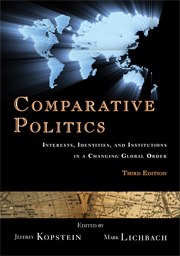Book contents
- Frontmatter
- Contents
- List of Maps
- Preface to the Third Edition
- List of Contributors
- 1 What Is Comparative Politics?
- 2 The Framework of Analysis
- PART ONE EARLY DEVELOPERS
- PART TWO MIDDLE DEVELOPERS
- PART THREE LATE DEVELOPERS
- PART FOUR EXPERIMENTAL DEVELOPERS
- 9 Mexico
- 10 India
- 11 Iran
- 12 South Africa
- 13 The European Union
- 14 Nigeria
- STOP AND COMPARE
- Index
- References
12 - South Africa
from PART FOUR - EXPERIMENTAL DEVELOPERS
- Frontmatter
- Contents
- List of Maps
- Preface to the Third Edition
- List of Contributors
- 1 What Is Comparative Politics?
- 2 The Framework of Analysis
- PART ONE EARLY DEVELOPERS
- PART TWO MIDDLE DEVELOPERS
- PART THREE LATE DEVELOPERS
- PART FOUR EXPERIMENTAL DEVELOPERS
- 9 Mexico
- 10 India
- 11 Iran
- 12 South Africa
- 13 The European Union
- 14 Nigeria
- STOP AND COMPARE
- Index
- References
Summary
Introduction
As one of the world's youngest democracies, South Africa seeks to escape a bitter political legacy. During the second half of the twentieth century, its white minority government systematically built a powerful, militarized state around institutions of racial oppression. Starting even earlier, the discovery of minerals enabled the development of an industrial economy, which thrust Africans and the descendants of European settlers into close contact in the country's burgeoning urban areas. Predictably, political conflicts erupted between blacks, who provided labor, and whites, who benefited from economic growth. Because the old regime was dead set against political change until the late 1980s, the struggle over apartheid (as extreme racial segregation was called in South Africa) seemed destined to end in a cataclysm of violence.
That a bloodbath was averted was one of the most remarkable stories of an eventful interlude of global democratization. Against the odds, political leaders from both sides (but especially the visionary Nelson Mandela, president of the African National Congress) came to recognize that the long-term interests of South Africa's deeply divided communities were inextricably intertwined. Through tough negotiation and painful compromise, hardheaded opponents forged an elite pact, albeit against the backdrop of popular mobilization, that allowed the country to hold an open election and to install the country's first democratic government in 1994. The world welcomed this transition as marking both the end of colonial rule in Africa and the burial of the last twentieth-century government based on myths of racial supremacy.
- Type
- Chapter
- Information
- Comparative PoliticsInterests, Identities, and Institutions in a Changing Global Order, pp. 460 - 495Publisher: Cambridge University PressPrint publication year: 2008



